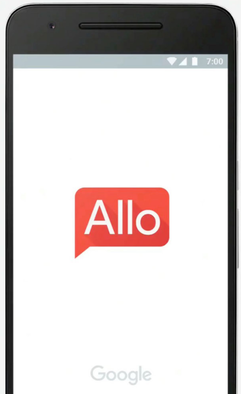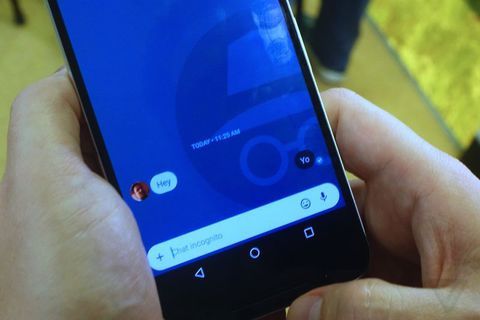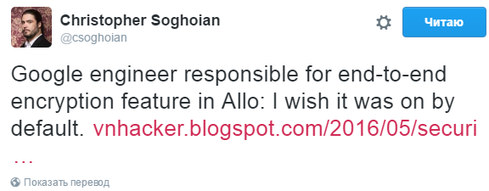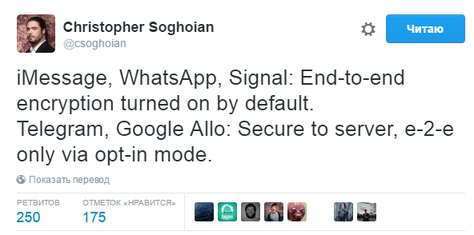Google promises to release a new messenger
Google announced the release of a new messenger called Allo, the concepts of which were presented at the last Google I / O 2016 conference. The application for smartphones will allow you to conduct convenient text correspondence between users. The release of Allo is scheduled for this summer, the application itself will be free and will be available only for Google Android and Apple iOS mobile platforms. According to Google, Allo will not replace the already existing company messengers, for example, Hangouts, but simply complement them. Another company application, Duo, will also allow you to make video calls.

The application has already received a number of negative assessments from such recognized security experts as Edward Snowden , Christopher Soghoian and Graham Cluley . We are talking about end-to-end encryption, which is optional in Allo and is activated only in a special incognito mode. Thus, by default, Google will be able to store user correspondence data on its servers and give them access to special services. Recall that earlier, by default, end-to-end encryption was acquired by such popular instant messengers as WhatsApp and Viber, which use Signal-Open Whisper Systems technology.
')

Fig. The interface of the application Allo on a smartphone. (data from The Verge)
Google calls Allo "smart messenger", as it contains some fairly exclusive features for instant messengers. For example, typing the word "@google", the application user can get instant access to the company's services in the application itself, for example, to search. The messenger will also be able to attach the user "smart answers" to a question from the other side. Such answers from the smart assistant will include links to photos stored on the device.

Meanwhile, one of the authors Allo expressed his point of view that Google might even think about integrating default end-to-end encryption later, but only if it does not affect the user experience with the new messenger.

Earlier, in our previous posts, we already wrote about the functions of end-to-end encryption in various messengers and explained what caused this need. The hype that caused vendors to step up measures related to data encryption was caused by the revelations of the runaway NSA agent Edward Snowden, who pointed out the possibility of special services to access personal data of users.
In a scheme with end-to-end encryption, data is sent directly between two devices, and private keys intended for decrypting messages are stored on the devices themselves and no one except the users themselves can access them. This method greatly complicates the access of secret services to correspondence data, since they are not stored on the intermediate server of the service and the latter cannot decrypt them with its internal key. Server services companies store only data on public keys that are used by the parties to send messages.
Viber received end-to-end encryption by default
habrahabr.ru/company/eset/blog/283010
WhatsApp messenger got full end-to-end default encryption
habrahabr.ru/company/eset/blog/281014
Belgian security forces used WhatsApp because of the attacks
habrahabr.ru/company/eset/blog/280330
Militiamen took up whatsapp
habrahabr.ru/company/eset/blog/279205
Apple hired the author Signal
habrahabr.ru/company/eset/blog/278053

More information about the new messenger can be found in the article The Verge , as well as on the official Google website googleblog.blogspot.ru/2016/05/allo-duo-apps-messaging-video.html .

The application has already received a number of negative assessments from such recognized security experts as Edward Snowden , Christopher Soghoian and Graham Cluley . We are talking about end-to-end encryption, which is optional in Allo and is activated only in a special incognito mode. Thus, by default, Google will be able to store user correspondence data on its servers and give them access to special services. Recall that earlier, by default, end-to-end encryption was acquired by such popular instant messengers as WhatsApp and Viber, which use Signal-Open Whisper Systems technology.
')

Fig. The interface of the application Allo on a smartphone. (data from The Verge)
Google calls Allo "smart messenger", as it contains some fairly exclusive features for instant messengers. For example, typing the word "@google", the application user can get instant access to the company's services in the application itself, for example, to search. The messenger will also be able to attach the user "smart answers" to a question from the other side. Such answers from the smart assistant will include links to photos stored on the device.

Meanwhile, one of the authors Allo expressed his point of view that Google might even think about integrating default end-to-end encryption later, but only if it does not affect the user experience with the new messenger.
This is why I’m not sure what I’m looking for. It is an illusion. Users.

Earlier, in our previous posts, we already wrote about the functions of end-to-end encryption in various messengers and explained what caused this need. The hype that caused vendors to step up measures related to data encryption was caused by the revelations of the runaway NSA agent Edward Snowden, who pointed out the possibility of special services to access personal data of users.
In a scheme with end-to-end encryption, data is sent directly between two devices, and private keys intended for decrypting messages are stored on the devices themselves and no one except the users themselves can access them. This method greatly complicates the access of secret services to correspondence data, since they are not stored on the intermediate server of the service and the latter cannot decrypt them with its internal key. Server services companies store only data on public keys that are used by the parties to send messages.
Viber received end-to-end encryption by default
habrahabr.ru/company/eset/blog/283010
WhatsApp messenger got full end-to-end default encryption
habrahabr.ru/company/eset/blog/281014
Belgian security forces used WhatsApp because of the attacks
habrahabr.ru/company/eset/blog/280330
Militiamen took up whatsapp
habrahabr.ru/company/eset/blog/279205
Apple hired the author Signal
habrahabr.ru/company/eset/blog/278053

More information about the new messenger can be found in the article The Verge , as well as on the official Google website googleblog.blogspot.ru/2016/05/allo-duo-apps-messaging-video.html .
Source: https://habr.com/ru/post/301210/
All Articles